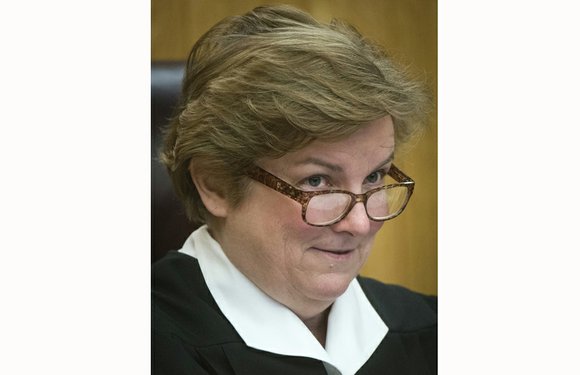Black lawmakers angered over Va. Supreme Court predicament
Jack White | 8/14/2015, 7:53 a.m. | Updated on 8/14/2015, 7:53 a.m.
African-American members of the Virginia General Assembly are seething at Republican leaders for putting them in a predicament over a judicial selection to the Virginia Supreme Court.
The problem began when intransigent Republican lawmakers became angered by Gov. Terry McAuliiffe’s refusal to postpone a Aug. 17 special legislative session devoted to legislative redistricting until after the fall General Assembly elections. The GOP leadership decided to take their revenge by unceremoniously dumping Gov. McAuliffe’s choice for a seat on the state’s highest court — a white female — and electing an African-African male.
Gov. McAuliffe denounced the Republicans’ plan last week as a “political temper tantrum.”
But the situation left Virginia Legislative Black Caucus members with a difficult choice. They could opt to fight a dogged battle to keep Justice Jane Marum Roush, a highly regarded jurist from Fairfax County whom Gov. McAuliffe appointed in late July, on the state Supreme Court knowing that the effort is doomed because Republicans control both houses of the General Assembly.
Or they could stand by, watch Republicans stick a thumb in the eye of the governor, and allow Judge Rossie D. Alston Jr., an equally respected Virginia Court of Appeals judge from Prince William County, to be voted in as a historic third African-American member of the seven-member court without any serious scrutiny when the special legislative session begins on Monday.
In the end, the black lawmakers resolved to back Gov. McAuliffe and stick with Justice Roush. They are especially infuriated by the Republicans’ refusal to schedule a hearing at which both Justice Roush and Judge Alston could be questioned about their records and judicial philosophy so that lawmakers — and the public — can decide who would be the better choice.
“Justice Roush is a judge with 22 years of experience who is now a sitting justice. Explanations given for removing her are vague, perplexing, and inexplicable,” Sen. Mamie E. Locke of Hampton, chair of the Virginia Legislative Black Caucus, said in a letter Monday to GOP House and Senate leaders.
“We can also add that removal of a gubernatorial interim appointment has not been done in well over a century. Which begs the question, why now?”
Sen. Locke continued: “This wrangling has yet again put the General Assembly in the position of being accused of political posturing, placing partisanship ahead of good government. However, this time we are playing politics with the independence of the judiciary, a value which is fundamental to our system of government.”
If Republicans had acceded to a demand from Democratic leaders to schedule “full, fair and open hearings” on the qualifications of the two jurists, black lawmakers wanted to cross-examine Judge Alston about his record before he ascended to the appeals court in 2009.
Before his elevation to the appeals court, Judge Alston served three years as a general district court judge in Prince William, followed by eight years on the county’s circuit court.
Although no one was willing to publicly specify what questions they would have asked, a review of Judge Alston’s record suggests some areas they might have focused on.
Early in his legal career, Judge Alston, who earned a law degree from North Carolina Central University School of Law, worked for nearly five years with the National Right To Work Legal Defense Foundation, a Springfield-based nonprofit which, according to its website, was founded in 1968 “to eliminate coercive union power and compulsory unionism abuses through strategic litigation, public information and education programs.” In recent years, the foundation reportedly has been the beneficiary of substantial funding from Charles and David Koch, the conservative billionaires who bankroll many far right causes.
“Mr. Alston was a staff attorney at the foundation from 1984 until 1989,” a spokesman for the foundation told the Free Press. “As a 501(c)(3) charity, the foundation does not endorse candidates or nominees, but the current staff attorneys who worked alongside Mr. Alston speak highly of his character and his determination to defend the rights of the employees he represented while at the foundation.”
Some legal critics also raised questions about Judge Alston’s use of so-called “designer sentencing” while he served on the bench in Prince William County. In 2002, for example, Judge Alston sentenced a state trooper — who had been convicted of dropping a drunken driving charge against a 20-year-old woman in exchange for sex — to perform 3,500 hours of community service and spend two days in jail every January for seven years.
Although the sentence was supported by prosecutors because it guaranteed that the trooper, Buck Carter, would never serve again on any police force, it was denounced as too lenient by some critics.
In that same year, Judge Alston presided at the trial of Kevin C. Kelly, who left his baby daughter in his family’s sweltering van, where she died. In that case, the jury recommended a one-year jail sentence. Instead, Judge Alston ordered Mr. Kelly, the father of 13 children, to spend one night in jail for each of seven years and to run an annual blood drive in his late daughter’s name.
“That was a difficult case for me on many levels,” Judge Alston told The Washington Post in a 2007 interview. “It was compelling from the jurisprudence standpoint. But it was more compelling from a human standpoint.”
The irony is that Judge Alston is a distinguished judge who enjoys strong support from important legal organizations including the Old Dominion Bar Association, Virginia’s oldest and largest black legal group.
Both Judge Alston and Justice Roush were on a short list of highly qualified candidates from which Gov. McAuliffe made his selection. But the highly partisan manner in which Republicans are ramming through his election could cast a shadow of controversy over his term on the high court that could have been avoided by following a more orderly and open process.
As Sen. A. Donald McEachin of Henrico County, chairman of the Senate Democratic Caucus, bitterly complained this week, “We’ve never played politics with the judiciary like this before, and a price will have to be paid.”









